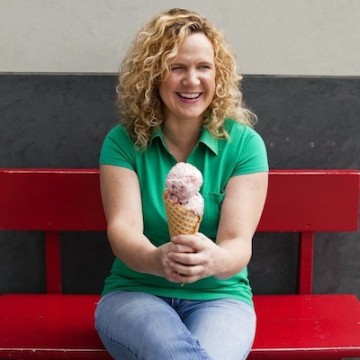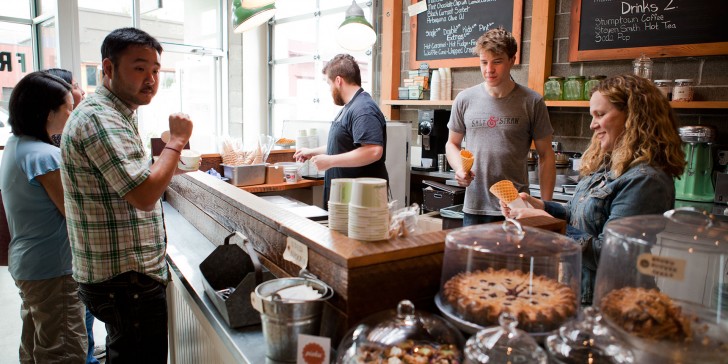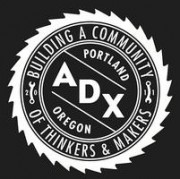Portland Made: Kim Malek of Salt and Straw
Monday, May 18, 2015

I left on a high note, having just snubbed Nike and Obama for missing the boat on the TPP trade policy. I consider myself to be a well educated and well informed citizen, and I still do not understand why our country continues to dismiss the connection between the growing frustrations of the working poor and our increasing investment in moving middle class jobs overseas.
The big questions on my mind are: What do we expect people to do, if they do not have access to economic opportunity? Or do we just send them to jail and allow corporations to profit off of them? What do we expect of the 50%+ kids that are falling through the cracks in our region? Do we send them on the pathway to prison or do we stand up and give them the skills they need to participate and thrive in the modern economy? Why are we telling them that college is their only option? Why aren't we giving them access to training opportunities for real work, in a real economy that really needs them?
What did I learn on my trip back east?
1. That the powers that be in government are incredibly disconnected from reality and mostly in the hands of big corporate influencers who are getting rich off of the backs of the working poor. But I guess I have always known this. It is just getting worse.
2. That taking an entrepreneurial approach to the Maker Movement has allowed us the flexibility to truly meet the needs of local makers. While most other cities in the nation take a nonprofit or governmental approach to program development that creates silos, red tape and inefficiencies, Portland entrepreneurs are working collectively to create real economic activity that benefits our city in a real way. We just need to plug more people into the Maker Movement, especially those who are falling through the cracks.
3. That my gut about why Portland is such a big draw for so many people is on target. Our city’s sensibilities around the value of nature, about leading a purpose driven life and about embracing a more collaborative business model as a way to engage more people in a thriving local economy is striking a chord with people from around the world. And that this movement is mostly being led by women in stark contrast to the heavily monied world of tech.
One of the many Portland businesses that is making the connection between entrepreneurship, community, collaboration and a thriving economy is Kim Malek of Salt and Straw. Portland Made contributing writer, Peggy Acott sat down with Kim to find out more about the origins and evolution of her incredibly successful ice cream business.
A name that gives a nod to the rock salt that people used with old-fashioned hand-crank ice cream makers to surround the container and chill the mixture inside, the straw that the container of finished ice cream was wrapped in to keep it cold on hot summer days. Co-Owner Kim Malek says the name is also appropriate because just like each hand-cranked ice cream was a small batch, the variety of flavors at Salt & Straw are also made in small batches; many utilizing locally-sourced seasonal ingredients, so the offerings change throughout the year.
Malek dreamed of having an ice cream shop for nearly twenty years before Salt & Straw opened its doors. She had worked for Starbucks (“in the early days, where there were only thirty stores”), and loved the sense of community engendered by the gathering of regular customers. She thought about an ice cream shop as having a similar appeal – where people could meet and have a pleasant experience together (who doesn’t love ice cream?). In 2011 she moved to Portland “for love,” and it was her future husband Mike’s support and belief in her dream that finally convinced her to give it a try.
Meanwhile her cousin Tyler had graduated with a degree in business in Seattle, but was discovering his true passion was food. When Malek told him of her plan, it was all he needed to hear. Like something straight out of a movie, Tyler “packed everything in his Subaru and moved to Portland” to help her while attending culinary school.
What they soon discovered was that lots of people were enthusiastic about their dream, willing to put their time, energy and expertise into helping them make it a reality. The strong collaborative energy in Portland gave them an idea for developing unique flavors of ice cream: “There are so many special, unique things being produced [in Portland] that to marry that with ice cream is bound to equal interesting flavors,” says Malek. A great example of this is when Tyler wanted to try to recreate the sundae of sticky rice, fresh fruit and ice cream that he had tasted while traveling in Asia. They contacted Andy Richter, chef-owner of Pok Pok, and asked if they could buy sticky rice from him. Andy said instead how about Tyler come to the Pok Pok kitchen and Andy would teach him how to make sticky rice? Malek says, “Andy had just won a James Beard award, and here he was, willing to teach Tyler how to make sticky rice for our ice cream.” From there they sought out others to collaborate with, “using ice cream as a canvas for telling local stories.”
Some of their favorite collaborations, however, have been with local schools. For the past four years, Salt & Straw runs a competition for new ice cream flavors amongst the schools closest to their store locations. Three winners’ creations get put on the menu and the money raised from the sales of their flavor goes back to the school. In one instance, Vernon Elementary School was able to glean sufficient seed money to enable them to apply for (and receive) a grant to refurbish and upgrade their playground.
These collaborations are central to the heart of Salt & Straw. “A strong business only exists as part of a strong community,” says Malek. And from the number of people who regularly flock to the Salt & Straw locations, it looks like she has indeed realized her dream of community building through the magic of ice cream.

________

Kelley Roy is the founder of ADX, a 14,000 square foot Makerspace where artists and designers work along side each other to prototype and launch new product lines. ADX is also open to the general public and teaches people of all ages how to make. And if you don't want to do it yourself, you can hire them to do it for you. For more information check out adxportland.com.
Portland Made is a digital storytelling platform and advocacy center for Portland's Maker Movement. We do 2 features a month on Portland Makers; connect makers with more local, national and international markets; connect makers with local professional and manufacturing resources; advocate for makers with politicians at all levels of government; work with PSU on an annual survey that captures the economic power of the Maker Movement; help makers find real estate; and promote Portland makers with local and national media.

Related Articles
- Portland Made: Food Incubator, Kitchen Cru
- Portland Made: Lamp Designer Shannon Guirl
- Portland Made: Leather Craftsman Geoff Franklin
- Portland Made: Oregon Kombucha Starter Kit
- Portland Made: Product Innovator, Sam Pardue of Indow
- Portland Made: Straight Razor Maker Scott Miyako
- Portland Made: Woodworker Josh Mabry




 Delivered Free Every
Delivered Free Every
Follow us on Pinterest Google + Facebook Twitter See It Read It